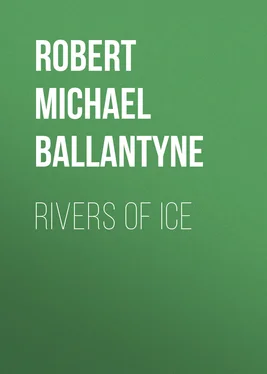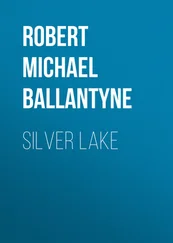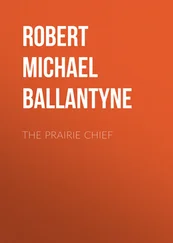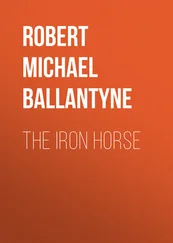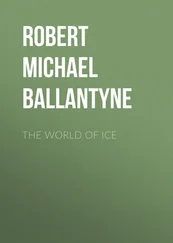Robert Michael Ballantyne - Rivers of Ice
Здесь есть возможность читать онлайн «Robert Michael Ballantyne - Rivers of Ice» — ознакомительный отрывок электронной книги совершенно бесплатно, а после прочтения отрывка купить полную версию. В некоторых случаях можно слушать аудио, скачать через торрент в формате fb2 и присутствует краткое содержание. Жанр: foreign_children, literature_19, foreign_antique, foreign_prose, на английском языке. Описание произведения, (предисловие) а так же отзывы посетителей доступны на портале библиотеки ЛибКат.
- Название:Rivers of Ice
- Автор:
- Жанр:
- Год:неизвестен
- ISBN:нет данных
- Рейтинг книги:5 / 5. Голосов: 1
-
Избранное:Добавить в избранное
- Отзывы:
-
Ваша оценка:
- 100
- 1
- 2
- 3
- 4
- 5
Rivers of Ice: краткое содержание, описание и аннотация
Предлагаем к чтению аннотацию, описание, краткое содержание или предисловие (зависит от того, что написал сам автор книги «Rivers of Ice»). Если вы не нашли необходимую информацию о книге — напишите в комментариях, мы постараемся отыскать её.
Rivers of Ice — читать онлайн ознакомительный отрывок
Ниже представлен текст книги, разбитый по страницам. Система сохранения места последней прочитанной страницы, позволяет с удобством читать онлайн бесплатно книгу «Rivers of Ice», без необходимости каждый раз заново искать на чём Вы остановились. Поставьте закладку, и сможете в любой момент перейти на страницу, на которой закончили чтение.
Интервал:
Закладка:
“You haven’t a spare room here, have you?” said the Captain, looking round.
Mrs Roby shook her head and said that she had not; and, besides, that if she had, it would be impossible for her to keep a lodger, as she had no servant, and could not attend on him herself.
“Mrs Roby,” said the Captain, “a gold-digging seaman don’t want no servant, nor no attendance. What’s up aloft?”
By pointing to a small trap-door in the ceiling, he rendered the question intelligible.
“It’s a garret, I believe,” replied Mrs Roby, smiling; “but having no ladder, I’ve never been up.”
“You’ve no objection to my taking a look, have you?” asked the Captain.
“None in the world,” replied the old woman. Without more ado the seaman rose, mounted on a chair, pushed open the trap-door, thrust his head and shoulders through, and looked round. Apparently the inspection was not deemed sufficiently close, for, to the old woman’s alarm and inexpressible surprise, he seized the edges of the hole with his strong hands, raised himself up, and finally disappeared in the regions above! The alarm of the old woman was somewhat increased by the sound of her visitor’s heavy tread on the boards overhead as he stumbled about. Presently his head appeared looking down through the trap. In any aspect, Captain Wopper’s shaggy head was an impressive one; but viewed in an upside-down position, with the blood running into it, it was peculiarly striking.
“I say, old lady,” he shouted, as if his position recalled the action and induced the tones of a boatswain, “it’ll do. A capital berth, with two portholes and a bunk.”
The Captain’s head disappeared, and immediately his legs took its place, suggesting the outrageous idea that he had thrown a somersault. Next moment his huge body slid down, and he stood on the floor much flushed and covered with dust.
“Now, old girl, is it to be?” he said, sitting down at the table. “Will you take me as a lodger, for better and for worse? I’ll fit up the berth on the main-deck, and be my own servant as well as your’s. Say the word.”
“I can refuse nothing to Willie’s friend,” said old Mrs Roby, “but really I—”
“Done, it’s a bargain,” interrupted the Captain, rising abruptly. “Now, I’ll go visit young Mr Lawrence and Mrs Stoutley, and to-morrow I’ll bring my kit, take possession of my berth, and you and I shall sail in company, I hope, and be messmates for some time to come.”
Chapter Three.
Difficulties among the Social Summits
In one of the many mansions of the “west end” of London, a lady reclined one morning on a sofa wishing that it were afternoon. She was a middle-aged, handsome, sickly lady. If it had been afternoon she would have wished that it were evening, and if it had been evening she would have wished for the morning; for Mrs Stoutley was one of those languid invalids whose enjoyment appears to be altogether in the future or the past, and who seem to have no particular duties connected with the present except sighing and wishing. It may be that this unfortunate condition of mind had something to do with Mrs Stoutley’s feeble state of health. If she had been a little more thoughtful about others, and less mindful of herself, she might, perhaps, have sighed and wished less, and enjoyed herself more. At all events her doctor seemed to entertain some such opinion, for, sitting in an easy chair beside her, and looking earnestly at her handsome, worn-out countenance, he said, somewhat abruptly, being a blunt doctor.
“You must go abroad, madam, and try to get your mind, as well as your body, well shaken up.”
“Why, doctor,” replied Mrs Stoutley, with a faint smile; “you talk of me as if I were a bottle of physic or flat ginger-beer.”
“You are little better, silly woman,” thought the doctor, but his innate sense of propriety induced him only to say, with a smile, “Well, there is at least this much resemblance between you and a bottle of flat ginger-beer, namely, that both require to be made to effervesce a little. It will never do to let your spirits down as you have been doing. We must brighten up, my dear madam—not Brighton up, by the way, we’ve had enough of Brighton and Bath, and such places. We must get away to the Continent this summer—to the Pyrenees, or Switzerland, where we can breathe the fresh mountain air, and ramble on glaciers, and have a thorough change.”
Mrs Stoutley looked gently, almost pitifully at the doctor while he spoke, as if she thought him a well-meaning and impulsive, but rather stupid maniac.
“Impossible, my dear doctor,” she said; “you know I could not stand the fatigues of such a journey.”
“Well, then,” replied the doctor, abruptly, “you must stop at home and die.”
“Oh! what a shocking naughty man you are to talk so.”
Mrs Stoutley said this, however, with an easy good-natured air, which showed plainly that she did not believe her illness likely to have such a serious termination.
“I will be still more naughty and shocking,” continued the doctor, resolutely, but with a twinkle in his eyes, “for I shall prescribe not only a dose of mountain air, but a dose of mountain exercise, to be taken—and the patient to be well shaken while taken—every morning throughout the summer and autumn. Moreover, after you return to England, you must continue the exercise during the winter; and, in addition to that, must have an object at the end of your walks and drives—not shopping, observe, that is not a sufficiently out-of-door object; nor visiting your friends, which is open to the same objection.”
Mrs Stoutley smiled again at this, and said that really, if visiting and shopping were forbidden, there seemed to be nothing left but museums and picture-galleries.
To this the doctor retorted that although she might do worse than visit museums and picture-galleries, he would prefer that she should visit the diamond and gold fields of the city.
“Did you ever hear of the diamond and gold fields of London, Miss Gray?” he said, turning to a plain yet pretty girl, who had been listening in silence to the foregoing conversation.
“Never,” answered Miss Gray, with a look of surprise.
Now, Miss Gray’s look of surprise induces us to state in passing that this young lady—niece, also poor relation and companion, to Mrs Stoutley—possessed three distinct aspects. When grave, she was plain,—not ugly, observe; a girl of nineteen, with a clear healthy complexion and nut-brown hair, cannot in any circumstances be ugly; no, she was merely plain when grave. When she smiled she was decidedly pretty, and when she laughed she was captivating—absolutely irresistible! She seldom laughed, occasionally smiled, and was generally grave. There was something quite incomprehensible about her, for she was not an unusually good girl, and by no means a dashing girl, neither was she an intensely modest girl—and yet, plain Emma Gray had perhaps driven more young men into a condition of drivelling imbecility than any acknowledged beauty of the metropolis.
Observe, we say “perhaps,” because we lay claim to no superhuman knowledge in regard to such matters.
“They are rather extensive fields,” continued the doctor, “scattered here and there about the metropolis, but lying chiefly in the city and on the banks of the Thames. They comprise many picture-galleries, too, and museums; the latter containing wonderful specimens of old bones and fossil remains, filth, and miscellaneous abominations, in which the gold and diamonds are imbedded—sometimes buried,—and the former being hung with subjects—chiefly interiors—incomparably superior, in respect of graphic power, to the works of Hogarth.”
“Oh! I know what you mean,” said Miss Gray, with a little smile.
Читать дальшеИнтервал:
Закладка:
Похожие книги на «Rivers of Ice»
Представляем Вашему вниманию похожие книги на «Rivers of Ice» списком для выбора. Мы отобрали схожую по названию и смыслу литературу в надежде предоставить читателям больше вариантов отыскать новые, интересные, ещё непрочитанные произведения.
Обсуждение, отзывы о книге «Rivers of Ice» и просто собственные мнения читателей. Оставьте ваши комментарии, напишите, что Вы думаете о произведении, его смысле или главных героях. Укажите что конкретно понравилось, а что нет, и почему Вы так считаете.
